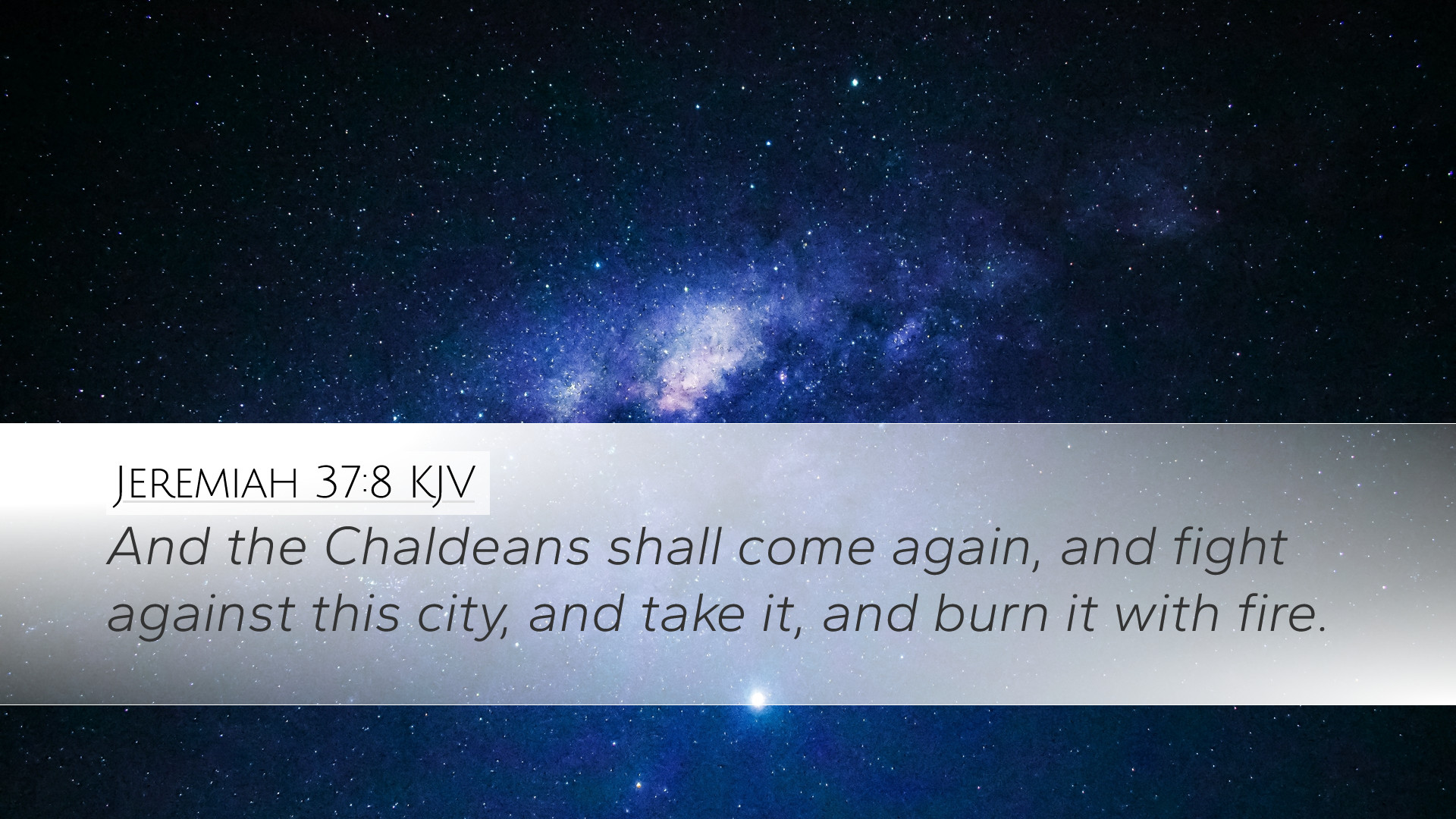Commentary on Jeremiah 37:8
Verse: "And the Chaldeans shall come again, and fight against this city, and take it, and burn it with fire."
Introduction
The verse Jeremiah 37:8 emerges from the narrative context of Jeremiah’s prophecies during the late Judean monarchy amidst the Babylonian siege. This commentary synthesizes insights from renowned public domain sources, particularly those of Matthew Henry, Albert Barnes, and Adam Clarke, aiming to provide a comprehensive understanding suitable for pastors, theologians, and scholars.
Historical Context
Jeremiah prophesied during a time of great turmoil in Judah, especially as Jerusalem faced the impending threat of conquest by the Babylonian army, often referred to as the Chaldeans. The socio-political landscape was marked by treachery and misplaced hopes in alliances with other nations rather than reliance on God.
Chaldeans as God's Instrument
As noted by Matthew Henry, the Chaldeans are depicted as instruments of divine judgment against the inhabitants of Jerusalem due to their persistent unfaithfulness to God. God used the powers of this world to accomplish His will, a theme prevalent in the prophetic literature.
The Thematic Significance
Jeremiah 37:8 encapsulates several themes relevant to theological discourse:
- Judgment: The prophecy indicates imminent judgment upon Jerusalem for its idolatry and rebellion.
- Hope and Despair: The duality of hope in human diplomacy versus despair in divine prophecy highlights the tension present in the hearts of the people.
- God’s Sovereignty: The inevitable outcome signifies God’s control over nations and history, asserting that His plans cannot be thwarted.
Verse Breakdown
“And the Chaldeans shall come again”
Albert Barnes notes that this repetition implies not only a return of military action but also an inevitable fulfillment of God's word. The phrase conveys the relentless pursuit of divine plans manifest through historical events.
“and fight against this city”
Barnes emphasizes the description of Jerusalem as a city under siege, illustrating the dire military threat. The verb "fight" implies not just an assault but a concerted effort to completely subjugate the city.
“and take it”
Adam Clarke remarks on the gravity of this statement, indicating that the city’s capture would fulfill not only Jeremiah’s prophecies but would also end in significant loss for the people, highlighting their rejection of God.
“and burn it with fire”
This final phrase serves as a stark warning. Henry comments that the complete destruction symbolized by fire indicates total devastation. In biblical literature, fire is often associated with purification through judgment, and here it signifies the final judgment upon a rebellious people.
Theological Implications
This verse is rich with theological significance, particularly in understanding the nature of divine justice and the consequences of national sin. It illustrates that while God is patient and longsuffering, there comes a decisive moment when judgment is enacted.
Divine Patience and Human Responsibility
Clarke emphasizes that the people of Jerusalem had been warned repeatedly of their impending doom through prophecy. Their rejection of these warnings exemplifies human responsibility in the face of divine grace. This has profound implications for theological reflection on the nature of free will and divine sovereignty.
The Role of Prophecy
Jeremiah’s message serves not only as a forewarning but also as an exhortation for repentance. Pastors and theologians can draw parallels to contemporary issues where divine warnings are ignored, emphasizing that the seriousness of God's word endures through time.
Practical Applications
For modern readers, Jeremiah 37:8 holds practical lessons regarding the weight of prophetic messages in our lives. The call to heed God's word remains critical. Pastors may utilize this verse in sermons to illustrate themes of repentance and accountability.
- Awareness of Consequences: Understanding that actions have consequences is paramount in both personal and communal faith walks.
- Faith in God over Human Solutions: Building trust in God rather than relying solely on political or worldly solutions is a recurring biblical theme.
- Urgency in Prophetic Voice: The urgency of God's warnings carried out through scriptures invites the Church to maintain vigilance in proclaiming truth.
Concluding Thoughts
Jeremiah 37:8 serves as a potent reminder of the seriousness of divine prophecy. Its implications extend beyond historical recollection into the realms of present faith and obedience. The insights gleaned from Matthew Henry, Albert Barnes, and Adam Clarke elucidate the multifaceted dimensions of this verse, affirming its relevance for both past and contemporary faith communities.


